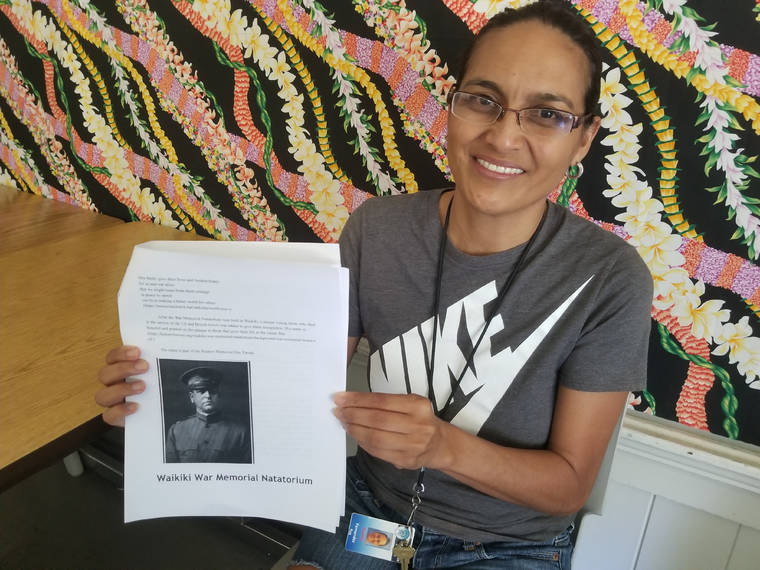HILO — Hilo Intermediate teacher Pualeilani Fernandez is doing her part to ensure the story and memory of U.S. Army Capt. Philip Overton Mills won’t be lost to history.
Fernandez, who has been researching his life and service, will deliver a eulogy for Mills next month at the Meuse-Argonne American Cemetery in France, where the soldier was buried after he was killed during training during World War I.
The effort is part of Memorializing the Fallen, a professional development program for teachers from National History Day, a nonprofit organization that seeks to improve the teaching and learning of history.
As part of the program, participants research and share the story of a “silent hero,” or an American service member who died during World War I.
“I thought I would be able to find somebody from Hawaii buried in France, but apparently, (with) Hawaii soldiers, the request was that all of their bones come back to Hawaii,” Fernandez said.
It was thought, though, that Mills, whose name is listed on the Waikiki Natatorium War Memorial on Oahu, had ties to Hawaii, but Fernandez said she is still trying to find the connection.
“I’m trying to figure out how did his name get to be on that natatorium,” she said.
According to Fernandez, Mills’ father, Brigadier Gen. Samuel Myers Mills, served in Hawaii around the turn of the 20th century, “so he could have been in Hawaii at one point, because his father was stationed here. But … the record’s still a little bit messy for me right now.”
Mills, who was raised in Concord, N.H., went to Harvard University, had a career in business and finance, and volunteered as an ambulance driver in France before America entered the war.
“I thought that was (interesting) because you know that you’re at risk, you know that you’re giving up your life for this bigger cause and to give up your professional career … to give all of that up and to go volunteer, I was like ‘how interesting that somebody would just say ‘yeah, I’m going to do this’ … knowing that your life is at risk.”
According to her research, Mills, who was born in Virginia in 1882 and died in France on July 25, 1918, enlisted in 1917 and was assigned to Company G, 308th Infantry, 77th Division.
Mills did not die in battle. Instead, Fernandez said he was training troops on how to use a rifle grenade that exploded and killed him.
Trying to do research while out of state has been a challenge for Fernandez, as opposed to teachers researching silent heroes from their states. Much of her information has come from second-hand sources.
In addition to the eulogy, Fernandez said participating teachers are also required to do lesson plans about the effects of WWI, as well as read a number of books, and attend online seminars and lectures.
“It’s great that I am able to be a part of this program being so far away in Hawaii, in this isolated place, that I get to still communicate with the other teachers and have this type of collaboration.”
She learned about National History Day from other colleagues last year and found out about Memorializing the Fallen by going through the organization’s website.
“And I said, ‘oh gosh, this would be a great opportunity to better educate myself about World War I if I did get accepted,’ and then it would be an opportunity for me to teach my students about World War I and create lesson plans and curriculum about World War I,” Fernandez said. “I learned so much more than what I anticipated on World War I. So I am excited to implement some of those things into what I’m teaching.”
Fernandez, who teaches seventh- and eighth-grade social studies and English/language arts, said she’s creating a lesson focusing on perspective and attitudes that people had between local residents and military members. Through the lesson, she wants students to learn to appreciate and accept differences.
She’s excited about her upcoming trip to France but the program has also proven to be educational.
“I think one thing that I already took away from the experience, was just having a better understanding of World War I,” Fernandez said. “I think when I did teach World War I at the high school level, I did have all these assumptions. You open the text book, you take it for granted — It says here, this is the reason, this is the cause of World War I, but that’s not really the case after you dig deeper in some of these more … in-depth sources.”
Anyone with any information about Capt. Philip Overton Mills, should contact Fernandez at pfernandez@viking.k12.hi.us.
Email Stephanie Salmons at ssalmons@hawaiitribune-herald.com.



